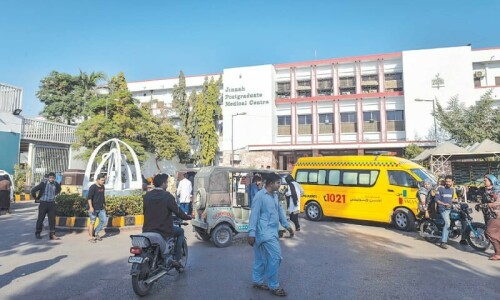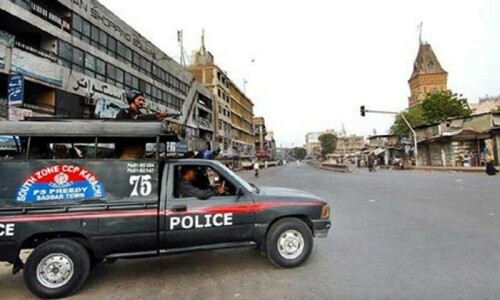
KARACHI: Interesting views were shared with a discerning audience by four eminent individuals during a panel discussion on ‘Democratising Heritage –– Culture in the Urban Context’ at the Mohatta Palace Museum on Thursday evening.
Architect Taimoor Khan Mumtaz said the title of his paper was ‘To have or to be’ taken from the name of one of Eric Fromm’s works. He said heritage shouldn’t be looked upon as [an] object; it’s also an expression of culture. And culture, according to one definition, is a container of shared values, ideas and symbols. Heritage should be valued not only as a historic memory but equally, if not more, as a container of our intellectual, philosophical and spiritual heritage.
He asked: “Why is it that today everything is reduced to object of desire, primarily of profit?” Then answered: “This is the current paradigm of hyper-consumerism based not on what we need, but on the creation of artificial needs fuelled by raw greed.” Thus for our governments, heritage is seen as a source of earnings through tourism. The collateral damage of this consumerism is environmental and cultural suicide. He said poet Akbar Allahbadi captured it as:
Chaar din ki zindagi hai koft se kya faeda
Kha double roti clerki ker khushi say phool ja
[Life is short, don’t waste it on feeling bad about it
Eat bread, become a clerk, and be happy]
Mr Mumtaz said heritage is a reminder of who we are, where we’re coming from and where we are to go.
‘It should be looked at with a wider angle, and even food, such as nihari, is heritage’
Nur Sobers Khan, who has worked at the British Library, named her presentation ‘Summering in London Archives –– Elitism and Cultural Heritage’. She said her talk raises the question what cultural heritage means and who has access to places where archives are kept.
Based on her experience working in the British Library, she first gave an institutional history of the library and what precious material (books, manuscripts etc) it contains related to cultural heritage of our region. She showed several images, including the earliest book printed in the Urdu script. After giving a detailed account of it, coming back to the title of her presentation, she told the attendees that she had had conversations with researchers about whether the collections in the library should be repatriated, to which they replied: “No. Where would we spend our summers and have coffee then?”
Founder of the Citizens Police Liaison Committee Jameel Yusuf also mentioned his experience as a tourist in Europe and inquired: “What does a well-maintained heritage structure give you?” In our context, he pointed out, it gives the younger generation the historical perspective of a city; but this should be for one and all, not only for the elite. Every structure should be subjected to a maintenance code, which we sadly don’t have, he argued and then showed a film about a road which used to be a dirty road and how it was nicely transformed and restored.
Architect Arif Hasan said there are two types of tangible heritage: one which is done through planning, and the other that people create themselves. Wrong planning destroyed a great deal of our heritage, he lamented. The Doxiades Plan, which resulted in the making of two satellite towns (Landhi-Korangi and New Karachi), changed the situation in the city. The old buildings were affected by it. This kept happening, that is, we kept planning for the city but never thought about its repercussions. On the contrary we didn’t plan in areas such as those which had historic places of worship.
Mr Hasan then spoke on the tangible heritage created by the people. He mentioned that there’s a gali between Icon Tower and the shrine of Hazrat Abdullah Shah Ghazi. For years people used to enter the shrine from that gali and also walk towards the sea from it. Today it’s closed off. Millions of people who used to pass it by (and because of which a bazaar emerged) can’t experience it again. “You have destroyed that world.”
Mr Hasan articulated that heritage should be looked at with a wider angle, and reasoned even food, such as nihari, is heritage.
The event moderated by Saima Zaidi was organised by the Endowment Fund Trust for Preservation of the Heritage of Sindh in collaboration with Habib University.
Published in Dawn, September 6th, 2019













































Dear visitor, the comments section is undergoing an overhaul and will return soon.